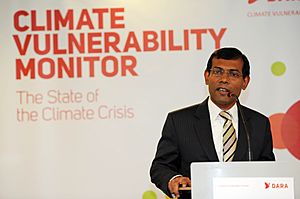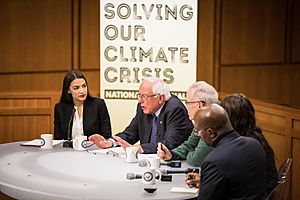Climate crisis facts for kids

The term climate crisis is used to describe global warming and climate change. It also covers their serious effects on our planet. This term, along with climate emergency, highlights the big threat global warming poses to people and Earth. People use these terms to encourage strong action to reduce climate change and make big changes to adapt to it.
Many people who use climate crisis believe it shows how serious the threats are. They hope it will encourage leaders to take action. Just like "global warming" made more people care than "climate change," they think "climate crisis" will have an even stronger effect. Studies show that "climate crisis" makes people feel a sense of urgency. However, some worry it might seem too extreme and cause people to ignore the message.
In January 2020, over 11,000 scientists wrote in the journal BioScience that "the climate crisis has arrived." They said we need to do much more to protect our biosphere (all life on Earth). This is important to avoid great suffering from the climate crisis.
Contents
Understanding the Science
Before 2014, scientists often used neutral words when talking about climate change. But groups and politicians often used stronger language. Around 2014, scientists themselves started using more urgent words. Terms like urgency, climate crisis, and climate emergency began appearing more in science papers and the news. Scientists started asking for bigger, "transformational" changes to adapt to climate change.
In 2020, over 11,000 scientists agreed that calling global warming a climate emergency or climate crisis was right. They said we need a huge effort to protect the biosphere. They warned about "troubling signs" that could lead to problems like large-scale human migration and food shortages. These signs include more meat production, more fossil fuel use, more greenhouse gas emissions, and deforestation. These activities are happening as global temperatures rise, ice melts, and extreme weather increases.
In 2019, scientists wrote in Nature that evidence from climate tipping points shows we are in a "planetary emergency." A tipping point is when a small change causes a much larger, often irreversible, change. They said the risk and urgency are "acute," meaning very serious. Earlier research showed that a global temperature rise of just 1 to 2 degrees Celsius could pass individual tipping points. We have already passed 1 degree Celsius of warming. More warming could cause many tipping points to happen at once.
What Does "Crisis" Mean Here?
When we talk about climate change, crisis means a very important or dangerous situation. It's a point where things could change a lot, possibly leading to a "tipping point." It's a situation that has never happened before.
Another way to define it is a "turning point" or a "dangerous condition." It means we need to act now, or the results will be very bad. The "climate crisis" also refers to all the bad effects that uncontrolled climate change is causing or could cause. These effects especially impact humanity.
How the Term is Used
Early Use
Former U.S. Vice President Al Gore has used crisis words since the 1980s. The Climate Crisis Coalition, formed in 2004, made the term climate crisis more official. A 1990 report mentioned legal texts using the word crisis. "The Cairo Compact: Toward a Concerted World-Wide Response to the Climate Crisis" (1989) said all nations must work together quickly to deal with this crisis.
Recent Use
In the late 2010s, climate crisis became a key phrase for climate activists. It was adopted by the Green New Deal, The Guardian newspaper, Greta Thunberg, and U.S. politicians like Kamala Harris. Its use grew after scientists gave new warnings and activists became more energized.
In late 2018, the United States House of Representatives created the United States House Select Committee on the Climate Crisis. This name showed how much energy politics had changed. The earlier House climate committee in 2007 was called the "Select Committee on Energy Independence and Global Warming."
A group called Public Citizen reported that in 2018, less than 10% of articles in top U.S. newspapers used crisis or emergency for climate change. In 2019, Public Citizen started a campaign called "Call it a Climate Crisis." They asked major news groups to use the term. In the first four months of 2019, its use in U.S. media tripled. Groups like the Sierra Club and Greenpeace also urged news organizations to call climate change a crisis.
In 2019, language about climate changed. The UN Secretary General used stronger words. Al Gore's group, The Climate Reality Project, and Greenpeace asked news organizations to change their language. In May 2019, The Guardian newspaper started using "climate emergency, crisis or breakdown" and "global heating." Editor-in-Chief Katharine Viner said "climate change" sounded too mild for such a serious issue. The Guardian then helped start Covering Climate Now, a group that helps news organizations improve climate coverage.
In June 2019, the Spanish news agency EFE chose "crisis climática" as its preferred phrase. In November 2019, Hindustan Times also adopted the term. They felt "climate change" didn't show how huge the threat was. The Polish newspaper Gazeta Wyborcza also uses climate crisis.
In June 2019, climate activists protested outside The New York Times offices. They wanted the newspaper to use terms like climate emergency or climate crisis. This public pressure led New York City Council to declare a climate emergency declaration.
In November 2019, Oxford Dictionaries named climate crisis their Word of the year for 2019. They chose it because it matched the mood of the year.
In 2021, the Finnish newspaper Helsingin Sanomat made a special font called Climate Crisis. Its thickness changes to show Arctic sea ice decline, visualizing how ice has melted over time.
In updates to the World Scientists' Warning to Humanity in 2021 and 2022, scientists used climate crisis and climate emergency. They said we need quick, easy-to-understand updates on the climate emergency.
Does This Term Work?
In September 2019, journalist Emma Vickers said crisis terms might be "showing results." She mentioned a poll where 38% of U.S. adults called climate change a "crisis." Five years earlier, only 23% did. However, as of 2019, using crisis terms in declarations doesn't always make governments act.
Worries About "Crisis" Language
Using "emergency" language can have downsides. It might make climate change seem more important than other issues, causing groups to compete instead of work together. It could also make it harder for people to disagree within the climate movement.
This language might suggest that only governments can solve the problem. This could lead to solutions that people don't fully support. If there are no immediate, dramatic effects of climate change, calling it an emergency might make people disbelieve or feel overwhelmed. This could make them give up.
There's also a risk of "crisis fatigue." This means people might get tired of hearing about urgent threats over time. If strong actions aren't taken, the urgent message might lose its power. Experts say that fear usually doesn't create lasting action. Psychologists note that when people face danger, they might "fight, flight, or freeze." These reactions aren't helpful if they don't reduce the danger.
Sander van der Linden, a researcher, says fear can be "paralyzing." He prefers climate crisis because it shows both urgency and hope. He says people know that crises can be avoided and solved.
Climate scientist Katharine Hayhoe said in early 2019 that crisis language works best for those who already care about climate change but aren't acting. She added it's "not yet effective" for those who think climate activists are exaggerating. In Germany, journalists worry that crisis might make people think climate change is a temporary problem that will pass.
Studies on How People React
In 2019, a study looked at how different words affected people. It included 120 U.S. adults from different political groups. They measured emotional responses to terms like climate crisis, environmental destruction, and climate change.
The study found that Democrats had a 60% stronger emotional response to climate crisis than to climate change. For Republicans, the response to climate crisis was three times stronger than for climate change. For independent voters, climate crisis caused the strongest emotional response. The study concluded that climate crisis made people feel more urgency than neutral terms like global warming and climate change. It also didn't cause people to argue against the idea.
Other Related Terms
How a problem is named and described greatly affects how people see it. It also impacts their reactions. Climate change and its effects are often called climate risks in scientific papers.
Many other terms are used besides climate crisis:
- climate catastrophe (used for a 2019 David Attenborough documentary and recent floods)
- climate breakdown (climate scientist Peter Kalmus, 2018)
- climate chaos (The New York Times, 2019)
- global heating (Richard A. Betts, U.K., 2018)
- climate emergency (11,000 scientists, The Guardian, 2019)
- ecological breakdown, ecological crisis, ecological emergency (all from Greta Thunberg, 2019)
- climate disaster (The Guardian, 2019)
- environmental Armageddon (Fiji Prime Minister Frank Bainimarama)
- global boiling (U.N. Secretary-General António Guterres, 2023)
- climate hell (U.N. Secretary-General António Guterres, 2024)
Other terms studied for their effect include global warming, climate change, climatic disruption, and environmental collapse.
In 2022, The New York Times journalist Amanda Hess noted that "end of the world" descriptions, like climate apocalypse, are often used for the current climate crisis. These descriptions are spreading from the internet to books and movies.
See also
- Climate psychology
- Environmental communication
- Extinction Rebellion
- Media coverage of climate change
- Psychological impact of climate change
- Public opinion on climate change
- School Strike for Climate
Images for kids
 | Anna J. Cooper |
 | Mary McLeod Bethune |
 | Lillie Mae Bradford |







